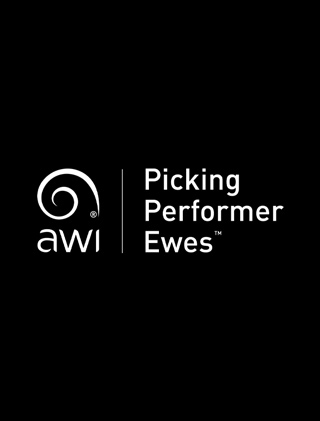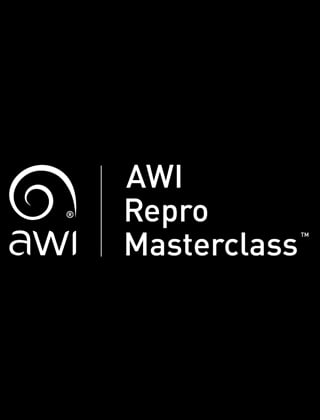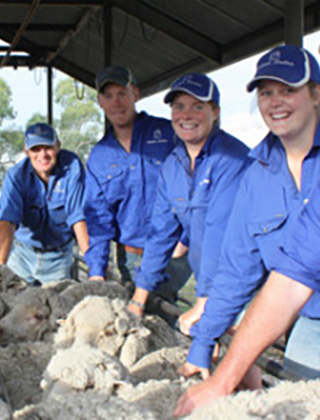Students learn about sheep management

This year for the first time, students from schools across Tasmania and Queensland joined their counterparts in South Australia, New South Wales and Western Australia to gain practical hands-on sheep management experience by looking after teams of Merino wethers as part of state competitions.
Merino wether competitions were held this year in five states across the country with their aim to educate high school students about the commercial production of Merino sheep. The initiatives provide the students with a memorable ‘hands on’ experience covering a broad range of sheep and wool production skills.
Each school team looked after several wethers (from studs in their state) for about six months, with the students forming a close relationship with their wethers. This provides a unique and practical experience for the students, much different from classroom learning. Each school team then showed their wethers during a competition later in the year and were judged according to their meat and wool quality.
By attending training and the judging events, and by looking after their wethers, the students gain:
- practical, hands-on skills in sheep management
- a better understanding of sheep and wool production as a business
- contact with many aspects of the Merino sheep industry
- a chance to network with industry participants and other students
- an enjoyable experience with Merino sheep and the industry
- a positive perspective on a career with sheep and wool.
This year, a special set of learning resources was made available on AWI’s Learn About Wool website to help teachers deliver an engaging and educational 10-week program about sheep and wool production to their students. The program is ideal for those taking part in the Merino wether competitions and it has been very well received by ag teachers.
The Merino wether competitions were initiated 13 years ago in South Australia by the SA Stud Merino Sheepbreeders Association (Merino SA), with similar competitions having since been introduced in New South Wales and Western Australia. Following the success of these three initiatives, this year students in Tasmania and Queensland were given the chance to take part in their own state competitions. A similar program is planned for Victoria next year.
All the competitions are supported by AWI, as well as individual studs, schools, teachers and students.
SOUTH AUSTRALIA
There was a large turnout of the next generation of woolgrowers – about 400 students from 39 schools – who participated in the 13th annual School Merino Wethers Competition organised by the SA Stud Merino Sheepbreeders Association (Merino SA) and held in September. 75 teams of three wethers (225 wethers) were brought into the Stud Sheep Pavilion at the Adelaide Showgrounds during the Royal Adelaide Show.
It was a hugely successful event with all the students providing a fantastic display of professionalism and dedication to the industry. As well as providing the students with a hands-on experience of commercial sheep and wool production, the competition enabled the students to have contact with many aspects of the Merino sheep industry from stud and commercial breeders, stock agents, wool buyers, through to processors. Unity College of Murray Bridge was the overall winner.
NSW
In NSW, 58 schools from across the state participated in the School Merino Wether Challenge, which was organised in partnership with the NSW Stud Merino Breeders Association, the Dubbo National Ram Sale Association and Bralca. There were more than 500 students from right across NSW and 348 wethers involved in the program this year. The challenge involved each school being allocated six wethers from the same age drop from Egelabra Merino Stud.
Training days were held throughout the course of the six-month challenge to provide ongoing assistance to school staff and students in caring for their team of wethers, as well as helping to develop industry skills and knowledge. At the end of the six months, in August, students converged on the Dubbo Showground where they presented their wethers for judging on commercial value. Deniliquin High School won the overall prize, followed by Parkes High School and Coleambally Central School.
At the event, students also had the opportunity to participate in activities to learn more about sheep handling, scanning and nutrition, and wool harvesting, while also hearing from a careers panel about the wide range of opportunities in the industry. A young judges’ competition also enabled students to put their skills to the test.
WESTERN AUSTRALIA
Now in its eighth year in WA, teams from five schools and colleges took part in the AWI Future Sheep Breeders Challenge that was organised in partnership with the Stud Merino Breeders' Association of WA (Merino WA). The judging took place at the end of September at the Perth Royal Show, with support from the Royal Agricultural Society of Western Australia. Teams looked after six wethers but showed four at judging. The overall winning team of the Future Sheep Breeders Award was WA College of Agriculture Harvey.
TASMANIA
The inaugural School Merino Wether Challenge in Tasmania was established by AWI this year in partnership with the Stud Merino Breeders Association of Tasmania. The Challenge kicked off in March and the response and engagement from schools across Tasmania was overwhelming. There were 13 schools from across the state that participated during the six months. During that time in which the students looked after the wethers, experts visited the schools to provide knowledge about the care of the sheep and share their expertise on the Merino breed. The sheep in the competition were donated by 13 separate woolgrowers from across the state, with the grand champion team donated by Roger Bignell of Kananga Pastoral at Waterhouse.
Eleven of the schools participated in the program’s concluding competition which was hosted by the Midland Agricultural Association at the Campbell Town Showgrounds at the end of September. It was a great day due to all the hard work and support of students, teachers and sponsors. There were three categories being judged on the competition day: Lilydale High School were awarded the highest carcass value, Scottsdale High School were awarded the highest fleece value, and the best presented group went to Bothwell High School. Scottsdale High School were also awarded the Grand Champion prize for the highest scoring team overall.
QUEENSLAND
The inaugural School Merino Wether Challenge in Queensland was held this year in partnership with the Queensland Merino Stud Sheepbreeders Association. The sheep were supplied by Peter and Linda Hacker of Roselea Merino Stud at Muckadilla. The schools looked after the sheep from late March until mid-August when the program’s concluding competition was held at the Royal Queensland Show (Ekka), attended by five schools (with one school taking two teams). The competition gave the students and teachers valuable insights into Merino sheep and their wool because, previously, most of the students had only interacted with British breed type sheep. At the Ekka, the students learnt more about Merinos at an information session organised by Queensland Department of Agriculture and Fisheries at which Michael Allpass from Agforce presented, and from competition judge Peter Sealy of Elders. Oakey State High School was the grand champion of the competition. During the program, AWI provided valuable resource material for the teachers to implement in their Ag programs.
This article appeared in the December 2023 edition of AWI’s Beyond the Bale magazine. Reproduction of the article is encouraged.

























